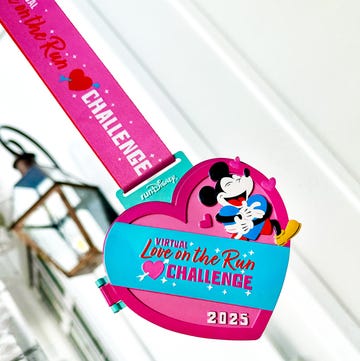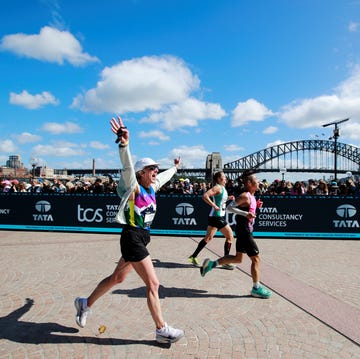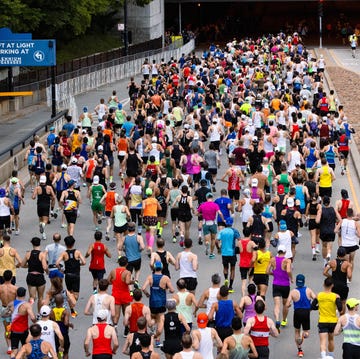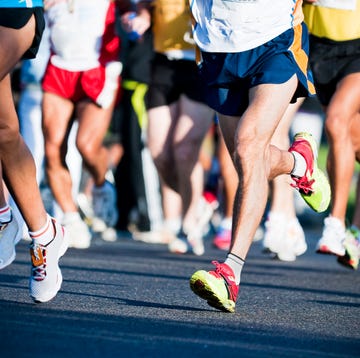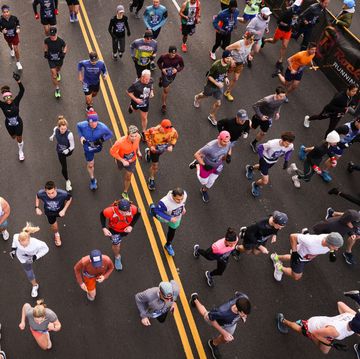Your strategies for taking in calories and fluid on race day can have a strong influence on your marathon performance. Let's look at how to optimize your fuel intake.
If you've done a good job of glycogen-loading during the several days before the race and topped off before the start, you'll have stored about 2,000 to 2,400 calories of glycogen. During the marathon, a typical 145-pound male burns about 100 calories per mile. Of those 100 calories, about 80 are supplied by carbohydrates and the remaining 20 by fat (this proportion varies depending on fitness and how hard you race), and you need about 2,100 calories of carbohydrates in the marathon (80 x 26.2 miles) and don't have much of a buffer against glycogen depletion. Sports drinks and energy gels are the solution to ensure you have the carbohydrates you need to get through the race.
How much you need to drink during the marathon to minimize dehydration depends on your body size and pace, the heat and humidity, and your sweat rate. The maximum amount you should drink during running is the amount that can empty from your stomach or the amount that you've lost as sweat, whichever is less. You should drink enough during the marathon so you don't lose more than about 2 to 3 percent of your body weight during the race. Drinking more than you've lost brings the risk of hyponatremia.
Research has shown that most runners' stomachs can empty only about 6 to 7 ounces (180 to 210 ml) of fluid every 15 minutes during running, representing about 24 to 28 ounces (720 to 840 ml) per hour. If you drink more than that, the extra fluid will just slosh around in your stomach and not provide any additional benefit. You may be able to handle more or less than the average, however, so experiment with how much liquid your stomach will tolerate during training at marathon pace. During the marathon, it's very difficult to drink 6 ounces of fluid at an aid station without stopping, and a 2007 study by Dr. Tim Noakes and colleagues found that most runners drink less than 16 ounces (480 ml) per hour when racing.
Let's assume that you take in 16 ounces of fluid per hour during the race. Drinking 16 ounces of a typical 6 percent carbohydrate drink will supply 29 grams of carbohydrates. Each gram of carbohydrate contains 4.1 calories, so you'll be taking in about 120 calories per hour. If you run the marathon in 3 hours, therefore, you'll take in about 360 calories during the race. The carbohydrates you consume during the race supply enough fuel to last an extra 4 to 5 miles. Even if you take in only half this amount, you'll substantially increase your chances of reaching the finish without running out of glycogen.
Energy gels are another method of taking in carbohydrates during the marathon. Energy gels are often available at selected aid stations or you can carry a few with you. Depending on the brand, each gel packet typically contains between 80 and 150 calories of carbohydrates. Energy gels are the consistency of pudding. You must follow gels with a couple of sips of fluid to wash them down, and a few sips more to help absorb the gel. The best time to take an energy gel is shortly before an aid station. As always, don't wait until race day to try an energy gel because it takes practice to get the water intake right and to feel comfortable running after taking a gel.
Unless you're an elite marathoner, I believe the best strategy on a warm and humid day is to stop and drink at the aid stations. Aid stations in a marathon are often every 5K or every 2 miles, so there are about 8 to 12 stops. If you stop for 10 seconds at each station, you'll add about 1 to 2 minutes to your time. If you run through the stops while drinking, you'll slow a little anyway, so stopping isn't going to add much time, and can repay you with 10 to 20 minutes gained by the finish of the marathon.
RELATED ARTICLE: Marathon Day



